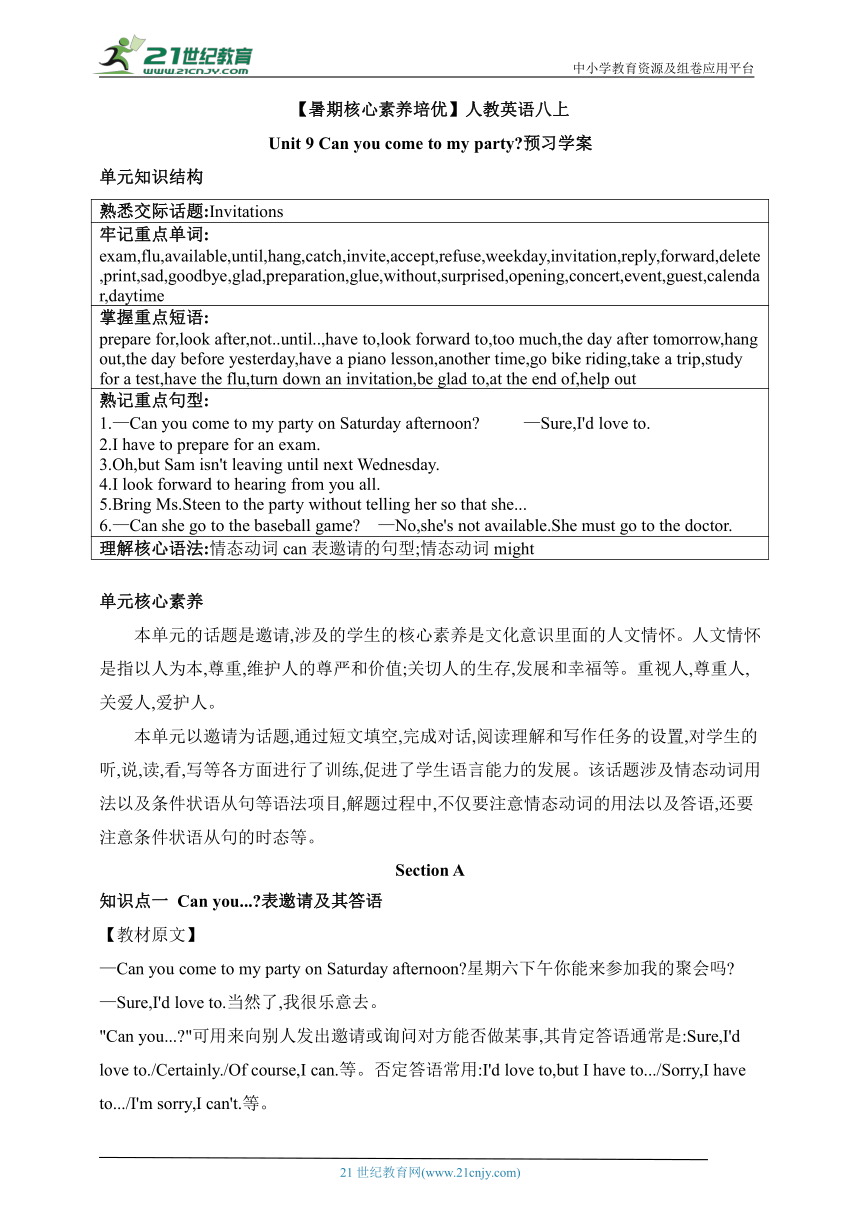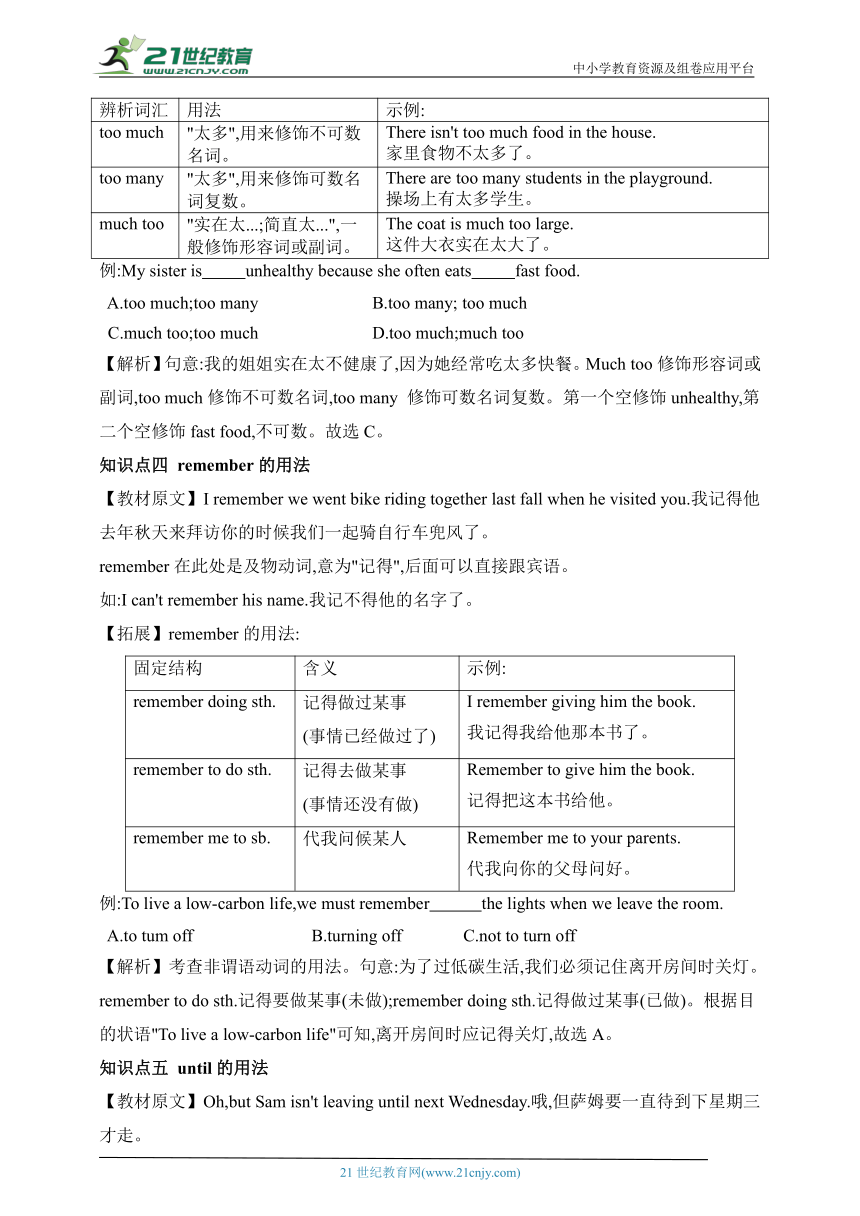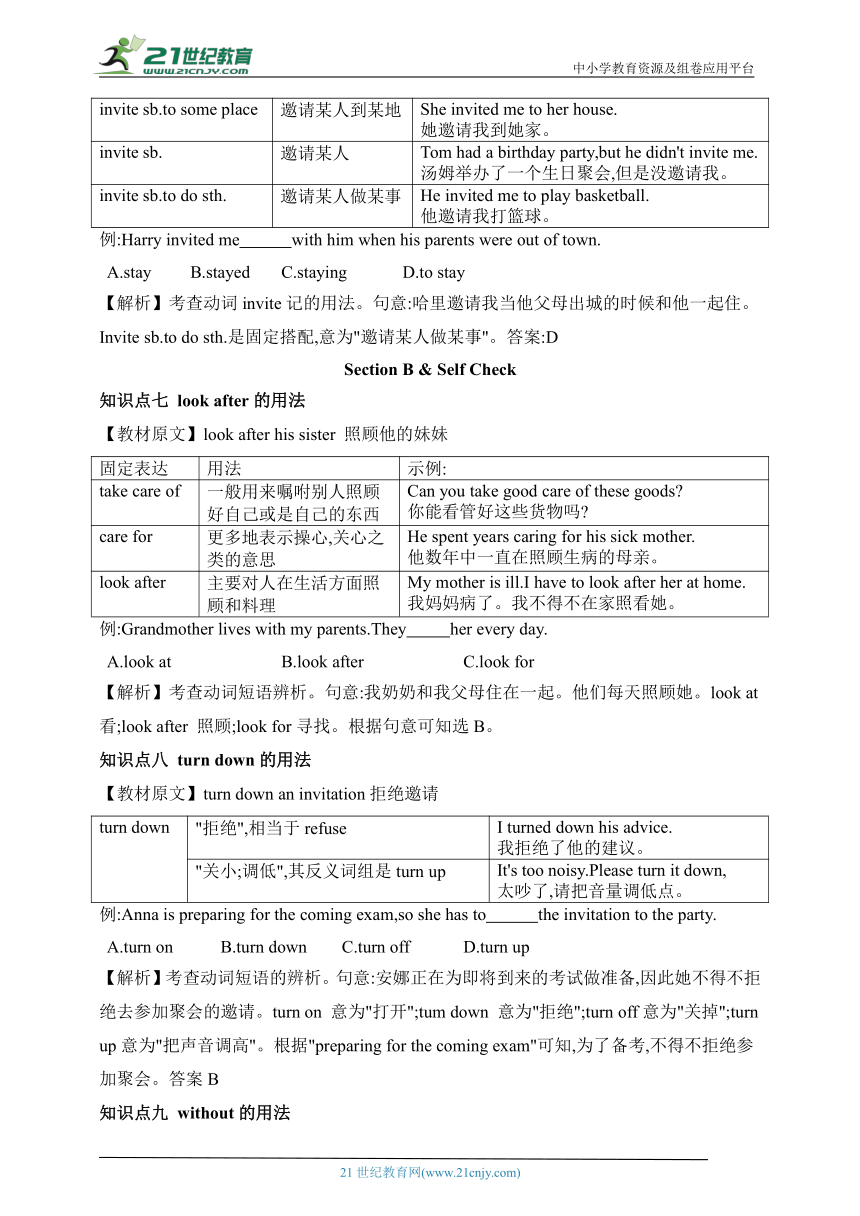【暑期核心素养培优】人教英语八上Unit 9 Can you come to my party?预习学案
文档属性
| 名称 | 【暑期核心素养培优】人教英语八上Unit 9 Can you come to my party?预习学案 |

|
|
| 格式 | doc | ||
| 文件大小 | 463.7KB | ||
| 资源类型 | 试卷 | ||
| 版本资源 | 人教新目标(Go for it)版 | ||
| 科目 | 英语 | ||
| 更新时间 | 2024-07-17 07:58:01 | ||
图片预览





文档简介
中小学教育资源及组卷应用平台
【暑期核心素养培优】人教英语八上
Unit 9 Can you come to my party 预习学案
单元知识结构
熟悉交际话题:Invitations
牢记重点单词:exam,flu,available,until,hang,catch,invite,accept,refuse,weekday,invitation,reply,forward,delete,print,sad,goodbye,glad,preparation,glue,without,surprised,opening,concert,event,guest,calendar,daytime
掌握重点短语:prepare for,look after,not..until..,have to,look forward to,too much,the day after tomorrow,hang out,the day before yesterday,have a piano lesson,another time,go bike riding,take a trip,study for a test,have the flu,turn down an invitation,be glad to,at the end of,help out
熟记重点句型:1.—Can you come to my party on Saturday afternoon —Sure,I'd love to.2.I have to prepare for an exam.3.Oh,but Sam isn't leaving until next Wednesday.4.I look forward to hearing from you all.5.Bring Ms.Steen to the party without telling her so that she...6.—Can she go to the baseball game —No,she's not available.She must go to the doctor.
理解核心语法:情态动词can表邀请的句型;情态动词might
单元核心素养
本单元的话题是邀请,涉及的学生的核心素养是文化意识里面的人文情怀。人文情怀是指以人为本,尊重,维护人的尊严和价值;关切人的生存,发展和幸福等。重视人,尊重人,关爱人,爱护人。
本单元以邀请为话题,通过短文填空,完成对话,阅读理解和写作任务的设置,对学生的听,说,读,看,写等各方面进行了训练,促进了学生语言能力的发展。该话题涉及情态动词用法以及条件状语从句等语法项目,解题过程中,不仅要注意情态动词的用法以及答语,还要注意条件状语从句的时态等。
Section A
知识点一 Can you... 表邀请及其答语
【教材原文】
—Can you come to my party on Saturday afternoon 星期六下午你能来参加我的聚会吗
—Sure,I'd love to.当然了,我很乐意去。
"Can you... "可用来向别人发出邀请或询问对方能否做某事,其肯定答语通常是:Sure,I'd love to./Certainly./Of course,I can.等。否定答语常用:I'd love to,but I have to.../Sorry,I have to.../I'm sorry,I can't.等。
如:—Can you go to the movies with me tonight 今晚你能与我一起去看电影吗
—Sure,I'd love to.当然,我很乐意去。
例:—Can you come to the concert with us — .I have to go to the doctor.
A.Sure,I'd love to B.Sony,that sounds great
C.I'm afraid not D.No,I’m available
【解析】考查交际用语。句意:—你能和我们一起去音乐会吗 —我恐怕不能。我得去看医生。根据答语中的"I have to go to the doctor."可知,对方不能去音乐会,因此应该说"我恐怕不能去"。答案C
知识点二 prepare的用法
【教材原文】I have to prepare for an exam:我必须为考试做准备。
prepare for 意为"为...做准备",同义短语还有:get ready for; make preparations for等。
如:The students are preparing/getting ready/making preparations for the coming sports meeting.学生们正在为即将到来的运动会做准备。
【拓展】prepare 常用短语归纳:
短语 示例:
prepare sth.准备...后接名词或代词作宾语。当宾语是食物类的名词时,可意为"制作" My mother is preparing dinner.我妈妈在做饭。
prepare sth.for sb.给某人准备某物 She prepared a nice breakfast for us.她为我们准备了一顿可口的早餐。
prepare for sth.为...做准备 I have to prepare for the party tomorrow.我必须要为明天的聚会做准备了。
prepare to do sth.准备去做某事 He prepared to make friends by WeChat.他准备通过微信交朋友。
例:I have to prepare my math test Friday afternoon.
A.at;on B.for;on C.on;for
【解析】考查介词辨析。句意:我必须为星期五下午的数学考试做准备。prepare for..." 为...做准备";在星期五的下午用介词on,这是固定用法,故选B。
知识点三 too much的用法
【教材原文】I have too much homework this weekend.这周末我有太多的家庭作业。
too much 修饰不可数名词,用来强调其"量"超出了正常的范围。too 用来修饰形容词或副词,表示"太"的意思,其程度比very.so,quite要强得多。
如:He sometimes finds his teacher leaves them too much homework to do.
他有时发现老师留给他们做的家庭作业太多了。
I don't want to eat too much food every day.我不想每天吃太多的食物。
辨析词汇 用法 示例:
too much "太多",用来修饰不可数名词。 There isn't too much food in the house.家里食物不太多了。
too many "太多",用来修饰可数名词复数。 There are too many students in the playground.操场上有太多学生。
much too "实在太...;简直太...",一般修饰形容词或副词。 The coat is much too large.这件大衣实在太大了。
例:My sister is unhealthy because she often eats fast food.
A.too much;too many B.too many; too much
C.much too;too much D.too much;much too
【解析】句意:我的姐姐实在太不健康了,因为她经常吃太多快餐。Much too修饰形容词或副词,too much修饰不可数名词,too many 修饰可数名词复数。第一个空修饰unhealthy,第二个空修饰fast food,不可数。故选C。
知识点四 remember的用法
【教材原文】I remember we went bike riding together last fall when he visited you.我记得他去年秋天来拜访你的时候我们一起骑自行车兜风了。
remember在此处是及物动词,意为"记得",后面可以直接跟宾语。
如:I can't remember his name.我记不得他的名字了。
【拓展】remember的用法:
固定结构 含义 示例:
remember doing sth. 记得做过某事(事情已经做过了) I remember giving him the book.我记得我给他那本书了。
remember to do sth. 记得去做某事(事情还没有做) Remember to give him the book.记得把这本书给他。
remember me to sb. 代我问候某人 Remember me to your parents.代我向你的父母问好。
例:To live a low-carbon life,we must remember the lights when we leave the room.
A.to tum off B.turning off C.not to turn off
【解析】考查非谓语动词的用法。句意:为了过低碳生活,我们必须记住离开房间时关灯。remember to do sth.记得要做某事(未做);remember doing sth.记得做过某事(已做)。根据目的状语"To live a low-carbon life"可知,离开房间时应记得关灯,故选A。
知识点五 until的用法
【教材原文】Oh,but Sam isn't leaving until next Wednesday.哦,但萨姆要一直待到下星期三才走。
句中的until有以下用法:
(1)作介词时,until 意为"直到某一时刻;直到发生某事"用于肯定句中。
如:It may last until Friday.它可能要延续到星期五。
He will be working until 5 o'clock.他将一直工作到五点钟。
【温馨提示】:此时意为"直到...时(为止)"或在...以前"。谓语动词须是持续性动词,如live,wail,last,love等。
②用于否定句中。
如:Don't open it until your birthday.等到你过生日再打开它。
She didn't sleep until eight.她到八点钟才睡觉。
【温馨提示】:此时意为"直到...才..."或"直到...之前(还不...)"
(2)作连词时,until意为"直到...为止"。
①主句为肯定句。
如:Continue walking in this direction until you see a sign.
一直朝着这个方向走直到你看见指示牌。
He ran until he was breathless.他一直跑到气喘吁吁才停下。
注意:until作连词,主句为肯定句时,表示主句的动作一直持续到从句动作发生或状态出现时。一般可意为"直到...为止"。在这种用法中,主句的谓语动词必须是持续性动词,如: live, wait,last,love,like,stay,work,continue等。
②主句为否定句。
如:I didn't realize she was foreign until she spoke.她不说话我还一直不知道她是个外国人。
I won't stop shouting until you let me go.你不放我,我就一直喊叫。
注意:until 作连词,主句为否定句时,表示主句的动作在从句的动作发生之前尚未发生,或者说主句的动作在从句的动作发生之后才开始。可意为"直到....才..."。
例:She didn't leave the school she worked out this problem.
A.as long as B.until C.since D.while
【解析】考查连词辨析。句意:直到解出这道题,她才离开学校。as long as只要;until直到......为止;since 自从...以来;while 在...期间。not...until...是固定搭配,意为"直到...才...",故选B。
知识点六 invite的用法
【教材原文】...invite three students to your party.邀请三名学生去你的聚会。
invite作及物动词,意为"邀请",invite的名词形式是invitation。invite的常用短语有:
固定表达 含义 示例:
invite sb.to some place 邀请某人到某地 She invited me to her house.她邀请我到她家。
invite sb. 邀请某人 Tom had a birthday party,but he didn't invite me.汤姆举办了一个生日聚会,但是没邀请我。
invite sb.to do sth. 邀请某人做某事 He invited me to play basketball.他邀请我打篮球。
例:Harry invited me with him when his parents were out of town.
A.stay B.stayed C.staying D.to stay
【解析】考查动词invite记的用法。句意:哈里邀请我当他父母出城的时候和他一起住。Invite sb.to do sth.是固定搭配,意为"邀请某人做某事"。答案:D
Section B & Self Check
知识点七 look after的用法
【教材原文】look after his sister 照顾他的妹妹
固定表达 用法 示例:
take care of 一般用来嘱咐别人照顾好自己或是自己的东西 Can you take good care of these goods 你能看管好这些货物吗
care for 更多地表示操心,关心之类的意思 He spent years caring for his sick mother.他数年中一直在照顾生病的母亲。
look after 主要对人在生活方面照顾和料理 My mother is ill.I have to look after her at home.我妈妈病了。我不得不在家照看她。
例:Grandmother lives with my parents.They her every day.
A.look at B.look after C.look for
【解析】考查动词短语辨析。句意:我奶奶和我父母住在一起。他们每天照顾她。look at看;look after 照顾;look for寻找。根据句意可知选B。
知识点八 turn down的用法
【教材原文】turn down an invitation拒绝邀请
turn down "拒绝",相当于refuse I turned down his advice.我拒绝了他的建议。
"关小;调低",其反义词组是turn up It's too noisy.Please turn it down,太吵了,请把音量调低点。
例:Anna is preparing for the coming exam,so she has to the invitation to the party.
A.turn on B.turn down C.turn off D.turn up
【解析】考查动词短语的辨析。句意:安娜正在为即将到来的考试做准备,因此她不得不拒绝去参加聚会的邀请。turn on 意为"打开";tum down 意为"拒绝";turn off意为"关掉";turn up意为"把声音调高"。根据"preparing for the coming exam"可知,为了备考,不得不拒绝参加聚会。答案B
知识点九 without的用法
【教材原文】Bring Ms.Steen to the party without telling her so that she canbe surprised.不要告诉斯蒂恩女士,直接把她带到聚会以便给她个惊喜。
without是介词,意为"没有"。常见用法如下:
(1)表示否定,意为"没有,无"。
如:He went out without his umbrella.他外出没有带伞。
(2)其后除可接名词或代词外,也可接动名词。
如:He walked past me without speaking.
他从我身旁走过,一句话也没说。
(3)有时表示条件,意为"若无;若非"。
如:We cannot live without water.没有水,我们就活不了。
例:—Reading is a good way to spend the time on the plane.
—That's true.I never go travelling a book
A.without B.on C.about
【解析】考查介词辨析。句意:—读书是在飞机上消磨时间的好方法。—那是真的。我出去旅行从来没有不带书。without 没有;on 在...上;about 关于。根据上句"Reading is a good way to spend the tine on the plane."可知,这里是说没有书我从不去旅行。故选A。
知识点十 so that的用法
【教材原文】Bring Ms.Steen to the party without telling her so that she can be surprised.不要告诉斯蒂恩女士,直接把她带到聚会以便给她个惊喜。
so that引导目的状语从句时,表示"以便;为了",从句中常使用can/could/may/might等情态动词;引导结果状语从句时,从句中一般不用can和may等词,在so that前可以用逗号,意思是"因此;所以"。
如:He got up early so that he could catch the early bus.
他起得很早以便他能赶上早班公共汽车。
He got up late so that he missed the early bus.他起晚了,因此他错过了早班公共汽车。
例:我们应该学好英语,以便能向世界讲述中国故事。(完成译句)
We should learn English well we can tell China stories to the world.
【解析】学好英语的目的是能向世界讲述中国故事。后面是表示目的的从句。引导目的状语从句应用so that,意为"以便"。答案so that
知识点十一 took forward to的用法
【教材原文】look forward to hearing from you all我期盼着你们所有人的答复。
(1)look forward to意思是"期待,盼望"。to是介词,后面接名词或者动名词。
如:I look forward to seeing you again.我盼望再次见到你。
He looks forward to your letters.他盼望着你的信件。
例:非常期待在下次聚会见到您。
I'm really at the next gathering.
【解析】look forward to doing sth.意为"期待做某事",这是固定搭配,t如是介词,后面要接动名词。答案looking forward to meeting/seeing you
(2)hear from 是固定短语,意为"收到(某人的)信,电话等"。
如:I heard from my pen pal last week.上周我收到了我笔友的来信。
例:—Do you often your pen pal
—Yes,quite often.We often talk about our school life in the letters.
A.agree with B.hear from C.hang out D.look for
【解析】考查动词短语辨析。句意:—你经常收到你笔友的来信吗 —是的,经常收到。我们经常在信中谈论我们的学校生活。agree with同意;hear from收到某人的来信;hang out 闲逛;look for寻找。根据"We often talk about our school life in the letters."可知,问句应该是"你经常收到你笔友的来信吗 ",故选B。
语法精讲精解
情态动词can的用法
1.can是一个常用的情态动词,意为"能;会",表示说话人的感情和语气,没有人称和数的变化,其后接动词原形。含有can的句子变疑问句时不加助动词,直接将其提前即可;can的否定式为 can't。can的过去式为could,其否定式为couldn't。
如:Can you go to the concert with me this evening 今晚你能和我一起去音乐会吗
2.can的常见用法如下:
(1)表示能力,意思是"能;会"。如:
—Can you speak French 你会说法语吗
—No,I can't不,我不会。
(2)表示许可,意为"可以",相当于 may。另外 could 也可以表示许可,但语气更加委婉。
如:You can take the car,if you want.如果你想的话,你可以坐汽车。
(3)用于发出邀请。对其作肯定回答通常用Sure/Yes,I'd love to.;作否定回答通常用Sorry,I can't.I have to...。
如:—Can you give me some advice 你能给我一些建议吗
—Of course,当然可以。
(4)表示推测,用于疑问句,否定句中,意为"会;可能"。
如:That can't be Mr.Liu.He is not here at the moment.那不可能是刘先生。他此刻不在这里。
(5)表示禁止,意为"不准;禁止"。
如:You can't play in the street.你们不准在街道上玩。
注意:表否定推测时要用can't,而不能用mustn't.may not等。
如:—Mary must be at school.玛丽肯定在学校。
—She can't be at school.I saw her in the street just now.
她不可能在学校,刚才我在街上看见她了。
巧学妙记
can的用法很重要,千变万化都知道。肯定用can加原形,否定把 can变can't,
疑问can就往前提,原形留在主语后。表达能力,许可和推测,发出邀请会拒绝。
易错易混辨析
1.so that与so...that...
(1)so that引导目的状语从句时,表示"以便;为了",从句中常使用can/could/may等情态动词;引导结果状语从句时,从句中一般不用can和may等词,在so that前可以用逗号,意思是"因此;所以"。
如:The little boy saved every coin so that he could buy his mother a present on Mother's Day.
这个小男孩节省下来每一枚硬币以便他能在母亲节给他妈妈买一份礼物。
(2)so...that...即"so+形容词或副词+that...",意思是"如此...以至于..."。
如:When the football fans saw Beckham,they got so excited that they cried out.
当足球迷们看到贝克汉姆时,他们如此激动以至于尖叫起来。
2.accept与receive
accept 意为"接受",指主观上愿意接受
receive 意为"收到",指客观上收到或拿到,但不包含接受者本人是否"接受"的意思
She accepted a present from her friend.她接受了朋友的礼物。
I received a letter from my sister last week.
上周我收到了我姐姐的一封来信。
3.bring,take与carry
bring 意为"带来;拿来",表示从别处将某人或某物带到或拿到说话者所在的地点来(由远而近)
take 与bring相对,意为"带去;拿去",指从说话者所在地把某人或某物带走或拿走(由近而远)
carry 指"随身携带(如提、拿、扛、抬、背、带等)",不具体说明来去的方向
Please ask your father to bring you here.请让你的爸爸把你带到这儿来。
Remember to take your books when you leave.当你离开的时候记得带走你的书。
She carried her baby in her arms.她把婴儿抱在怀里。
4.reply与answer
reply 用作及物动词时,后跟直接引语或that引导的从句;用作不及物动词时,后面与to连用,表示"回答某人的问题,信件等"
answer 可作及物动词,也可作不及物动词。可表示接听电话或对门铃等声响作出反应等
I'll reply to your letter tomorrow.明天我将给你回信。
Who can answer the question 谁能回答这个问题
HYPERLINK "http://21世纪教育网(www.21cnjy.com)
" 21世纪教育网(www.21cnjy.com)
【暑期核心素养培优】人教英语八上
Unit 9 Can you come to my party 预习学案
单元知识结构
熟悉交际话题:Invitations
牢记重点单词:exam,flu,available,until,hang,catch,invite,accept,refuse,weekday,invitation,reply,forward,delete,print,sad,goodbye,glad,preparation,glue,without,surprised,opening,concert,event,guest,calendar,daytime
掌握重点短语:prepare for,look after,not..until..,have to,look forward to,too much,the day after tomorrow,hang out,the day before yesterday,have a piano lesson,another time,go bike riding,take a trip,study for a test,have the flu,turn down an invitation,be glad to,at the end of,help out
熟记重点句型:1.—Can you come to my party on Saturday afternoon —Sure,I'd love to.2.I have to prepare for an exam.3.Oh,but Sam isn't leaving until next Wednesday.4.I look forward to hearing from you all.5.Bring Ms.Steen to the party without telling her so that she...6.—Can she go to the baseball game —No,she's not available.She must go to the doctor.
理解核心语法:情态动词can表邀请的句型;情态动词might
单元核心素养
本单元的话题是邀请,涉及的学生的核心素养是文化意识里面的人文情怀。人文情怀是指以人为本,尊重,维护人的尊严和价值;关切人的生存,发展和幸福等。重视人,尊重人,关爱人,爱护人。
本单元以邀请为话题,通过短文填空,完成对话,阅读理解和写作任务的设置,对学生的听,说,读,看,写等各方面进行了训练,促进了学生语言能力的发展。该话题涉及情态动词用法以及条件状语从句等语法项目,解题过程中,不仅要注意情态动词的用法以及答语,还要注意条件状语从句的时态等。
Section A
知识点一 Can you... 表邀请及其答语
【教材原文】
—Can you come to my party on Saturday afternoon 星期六下午你能来参加我的聚会吗
—Sure,I'd love to.当然了,我很乐意去。
"Can you... "可用来向别人发出邀请或询问对方能否做某事,其肯定答语通常是:Sure,I'd love to./Certainly./Of course,I can.等。否定答语常用:I'd love to,but I have to.../Sorry,I have to.../I'm sorry,I can't.等。
如:—Can you go to the movies with me tonight 今晚你能与我一起去看电影吗
—Sure,I'd love to.当然,我很乐意去。
例:—Can you come to the concert with us — .I have to go to the doctor.
A.Sure,I'd love to B.Sony,that sounds great
C.I'm afraid not D.No,I’m available
【解析】考查交际用语。句意:—你能和我们一起去音乐会吗 —我恐怕不能。我得去看医生。根据答语中的"I have to go to the doctor."可知,对方不能去音乐会,因此应该说"我恐怕不能去"。答案C
知识点二 prepare的用法
【教材原文】I have to prepare for an exam:我必须为考试做准备。
prepare for 意为"为...做准备",同义短语还有:get ready for; make preparations for等。
如:The students are preparing/getting ready/making preparations for the coming sports meeting.学生们正在为即将到来的运动会做准备。
【拓展】prepare 常用短语归纳:
短语 示例:
prepare sth.准备...后接名词或代词作宾语。当宾语是食物类的名词时,可意为"制作" My mother is preparing dinner.我妈妈在做饭。
prepare sth.for sb.给某人准备某物 She prepared a nice breakfast for us.她为我们准备了一顿可口的早餐。
prepare for sth.为...做准备 I have to prepare for the party tomorrow.我必须要为明天的聚会做准备了。
prepare to do sth.准备去做某事 He prepared to make friends by WeChat.他准备通过微信交朋友。
例:I have to prepare my math test Friday afternoon.
A.at;on B.for;on C.on;for
【解析】考查介词辨析。句意:我必须为星期五下午的数学考试做准备。prepare for..." 为...做准备";在星期五的下午用介词on,这是固定用法,故选B。
知识点三 too much的用法
【教材原文】I have too much homework this weekend.这周末我有太多的家庭作业。
too much 修饰不可数名词,用来强调其"量"超出了正常的范围。too 用来修饰形容词或副词,表示"太"的意思,其程度比very.so,quite要强得多。
如:He sometimes finds his teacher leaves them too much homework to do.
他有时发现老师留给他们做的家庭作业太多了。
I don't want to eat too much food every day.我不想每天吃太多的食物。
辨析词汇 用法 示例:
too much "太多",用来修饰不可数名词。 There isn't too much food in the house.家里食物不太多了。
too many "太多",用来修饰可数名词复数。 There are too many students in the playground.操场上有太多学生。
much too "实在太...;简直太...",一般修饰形容词或副词。 The coat is much too large.这件大衣实在太大了。
例:My sister is unhealthy because she often eats fast food.
A.too much;too many B.too many; too much
C.much too;too much D.too much;much too
【解析】句意:我的姐姐实在太不健康了,因为她经常吃太多快餐。Much too修饰形容词或副词,too much修饰不可数名词,too many 修饰可数名词复数。第一个空修饰unhealthy,第二个空修饰fast food,不可数。故选C。
知识点四 remember的用法
【教材原文】I remember we went bike riding together last fall when he visited you.我记得他去年秋天来拜访你的时候我们一起骑自行车兜风了。
remember在此处是及物动词,意为"记得",后面可以直接跟宾语。
如:I can't remember his name.我记不得他的名字了。
【拓展】remember的用法:
固定结构 含义 示例:
remember doing sth. 记得做过某事(事情已经做过了) I remember giving him the book.我记得我给他那本书了。
remember to do sth. 记得去做某事(事情还没有做) Remember to give him the book.记得把这本书给他。
remember me to sb. 代我问候某人 Remember me to your parents.代我向你的父母问好。
例:To live a low-carbon life,we must remember the lights when we leave the room.
A.to tum off B.turning off C.not to turn off
【解析】考查非谓语动词的用法。句意:为了过低碳生活,我们必须记住离开房间时关灯。remember to do sth.记得要做某事(未做);remember doing sth.记得做过某事(已做)。根据目的状语"To live a low-carbon life"可知,离开房间时应记得关灯,故选A。
知识点五 until的用法
【教材原文】Oh,but Sam isn't leaving until next Wednesday.哦,但萨姆要一直待到下星期三才走。
句中的until有以下用法:
(1)作介词时,until 意为"直到某一时刻;直到发生某事"用于肯定句中。
如:It may last until Friday.它可能要延续到星期五。
He will be working until 5 o'clock.他将一直工作到五点钟。
【温馨提示】:此时意为"直到...时(为止)"或在...以前"。谓语动词须是持续性动词,如live,wail,last,love等。
②用于否定句中。
如:Don't open it until your birthday.等到你过生日再打开它。
She didn't sleep until eight.她到八点钟才睡觉。
【温馨提示】:此时意为"直到...才..."或"直到...之前(还不...)"
(2)作连词时,until意为"直到...为止"。
①主句为肯定句。
如:Continue walking in this direction until you see a sign.
一直朝着这个方向走直到你看见指示牌。
He ran until he was breathless.他一直跑到气喘吁吁才停下。
注意:until作连词,主句为肯定句时,表示主句的动作一直持续到从句动作发生或状态出现时。一般可意为"直到...为止"。在这种用法中,主句的谓语动词必须是持续性动词,如: live, wait,last,love,like,stay,work,continue等。
②主句为否定句。
如:I didn't realize she was foreign until she spoke.她不说话我还一直不知道她是个外国人。
I won't stop shouting until you let me go.你不放我,我就一直喊叫。
注意:until 作连词,主句为否定句时,表示主句的动作在从句的动作发生之前尚未发生,或者说主句的动作在从句的动作发生之后才开始。可意为"直到....才..."。
例:She didn't leave the school she worked out this problem.
A.as long as B.until C.since D.while
【解析】考查连词辨析。句意:直到解出这道题,她才离开学校。as long as只要;until直到......为止;since 自从...以来;while 在...期间。not...until...是固定搭配,意为"直到...才...",故选B。
知识点六 invite的用法
【教材原文】...invite three students to your party.邀请三名学生去你的聚会。
invite作及物动词,意为"邀请",invite的名词形式是invitation。invite的常用短语有:
固定表达 含义 示例:
invite sb.to some place 邀请某人到某地 She invited me to her house.她邀请我到她家。
invite sb. 邀请某人 Tom had a birthday party,but he didn't invite me.汤姆举办了一个生日聚会,但是没邀请我。
invite sb.to do sth. 邀请某人做某事 He invited me to play basketball.他邀请我打篮球。
例:Harry invited me with him when his parents were out of town.
A.stay B.stayed C.staying D.to stay
【解析】考查动词invite记的用法。句意:哈里邀请我当他父母出城的时候和他一起住。Invite sb.to do sth.是固定搭配,意为"邀请某人做某事"。答案:D
Section B & Self Check
知识点七 look after的用法
【教材原文】look after his sister 照顾他的妹妹
固定表达 用法 示例:
take care of 一般用来嘱咐别人照顾好自己或是自己的东西 Can you take good care of these goods 你能看管好这些货物吗
care for 更多地表示操心,关心之类的意思 He spent years caring for his sick mother.他数年中一直在照顾生病的母亲。
look after 主要对人在生活方面照顾和料理 My mother is ill.I have to look after her at home.我妈妈病了。我不得不在家照看她。
例:Grandmother lives with my parents.They her every day.
A.look at B.look after C.look for
【解析】考查动词短语辨析。句意:我奶奶和我父母住在一起。他们每天照顾她。look at看;look after 照顾;look for寻找。根据句意可知选B。
知识点八 turn down的用法
【教材原文】turn down an invitation拒绝邀请
turn down "拒绝",相当于refuse I turned down his advice.我拒绝了他的建议。
"关小;调低",其反义词组是turn up It's too noisy.Please turn it down,太吵了,请把音量调低点。
例:Anna is preparing for the coming exam,so she has to the invitation to the party.
A.turn on B.turn down C.turn off D.turn up
【解析】考查动词短语的辨析。句意:安娜正在为即将到来的考试做准备,因此她不得不拒绝去参加聚会的邀请。turn on 意为"打开";tum down 意为"拒绝";turn off意为"关掉";turn up意为"把声音调高"。根据"preparing for the coming exam"可知,为了备考,不得不拒绝参加聚会。答案B
知识点九 without的用法
【教材原文】Bring Ms.Steen to the party without telling her so that she canbe surprised.不要告诉斯蒂恩女士,直接把她带到聚会以便给她个惊喜。
without是介词,意为"没有"。常见用法如下:
(1)表示否定,意为"没有,无"。
如:He went out without his umbrella.他外出没有带伞。
(2)其后除可接名词或代词外,也可接动名词。
如:He walked past me without speaking.
他从我身旁走过,一句话也没说。
(3)有时表示条件,意为"若无;若非"。
如:We cannot live without water.没有水,我们就活不了。
例:—Reading is a good way to spend the time on the plane.
—That's true.I never go travelling a book
A.without B.on C.about
【解析】考查介词辨析。句意:—读书是在飞机上消磨时间的好方法。—那是真的。我出去旅行从来没有不带书。without 没有;on 在...上;about 关于。根据上句"Reading is a good way to spend the tine on the plane."可知,这里是说没有书我从不去旅行。故选A。
知识点十 so that的用法
【教材原文】Bring Ms.Steen to the party without telling her so that she can be surprised.不要告诉斯蒂恩女士,直接把她带到聚会以便给她个惊喜。
so that引导目的状语从句时,表示"以便;为了",从句中常使用can/could/may/might等情态动词;引导结果状语从句时,从句中一般不用can和may等词,在so that前可以用逗号,意思是"因此;所以"。
如:He got up early so that he could catch the early bus.
他起得很早以便他能赶上早班公共汽车。
He got up late so that he missed the early bus.他起晚了,因此他错过了早班公共汽车。
例:我们应该学好英语,以便能向世界讲述中国故事。(完成译句)
We should learn English well we can tell China stories to the world.
【解析】学好英语的目的是能向世界讲述中国故事。后面是表示目的的从句。引导目的状语从句应用so that,意为"以便"。答案so that
知识点十一 took forward to的用法
【教材原文】look forward to hearing from you all我期盼着你们所有人的答复。
(1)look forward to意思是"期待,盼望"。to是介词,后面接名词或者动名词。
如:I look forward to seeing you again.我盼望再次见到你。
He looks forward to your letters.他盼望着你的信件。
例:非常期待在下次聚会见到您。
I'm really at the next gathering.
【解析】look forward to doing sth.意为"期待做某事",这是固定搭配,t如是介词,后面要接动名词。答案looking forward to meeting/seeing you
(2)hear from 是固定短语,意为"收到(某人的)信,电话等"。
如:I heard from my pen pal last week.上周我收到了我笔友的来信。
例:—Do you often your pen pal
—Yes,quite often.We often talk about our school life in the letters.
A.agree with B.hear from C.hang out D.look for
【解析】考查动词短语辨析。句意:—你经常收到你笔友的来信吗 —是的,经常收到。我们经常在信中谈论我们的学校生活。agree with同意;hear from收到某人的来信;hang out 闲逛;look for寻找。根据"We often talk about our school life in the letters."可知,问句应该是"你经常收到你笔友的来信吗 ",故选B。
语法精讲精解
情态动词can的用法
1.can是一个常用的情态动词,意为"能;会",表示说话人的感情和语气,没有人称和数的变化,其后接动词原形。含有can的句子变疑问句时不加助动词,直接将其提前即可;can的否定式为 can't。can的过去式为could,其否定式为couldn't。
如:Can you go to the concert with me this evening 今晚你能和我一起去音乐会吗
2.can的常见用法如下:
(1)表示能力,意思是"能;会"。如:
—Can you speak French 你会说法语吗
—No,I can't不,我不会。
(2)表示许可,意为"可以",相当于 may。另外 could 也可以表示许可,但语气更加委婉。
如:You can take the car,if you want.如果你想的话,你可以坐汽车。
(3)用于发出邀请。对其作肯定回答通常用Sure/Yes,I'd love to.;作否定回答通常用Sorry,I can't.I have to...。
如:—Can you give me some advice 你能给我一些建议吗
—Of course,当然可以。
(4)表示推测,用于疑问句,否定句中,意为"会;可能"。
如:That can't be Mr.Liu.He is not here at the moment.那不可能是刘先生。他此刻不在这里。
(5)表示禁止,意为"不准;禁止"。
如:You can't play in the street.你们不准在街道上玩。
注意:表否定推测时要用can't,而不能用mustn't.may not等。
如:—Mary must be at school.玛丽肯定在学校。
—She can't be at school.I saw her in the street just now.
她不可能在学校,刚才我在街上看见她了。
巧学妙记
can的用法很重要,千变万化都知道。肯定用can加原形,否定把 can变can't,
疑问can就往前提,原形留在主语后。表达能力,许可和推测,发出邀请会拒绝。
易错易混辨析
1.so that与so...that...
(1)so that引导目的状语从句时,表示"以便;为了",从句中常使用can/could/may等情态动词;引导结果状语从句时,从句中一般不用can和may等词,在so that前可以用逗号,意思是"因此;所以"。
如:The little boy saved every coin so that he could buy his mother a present on Mother's Day.
这个小男孩节省下来每一枚硬币以便他能在母亲节给他妈妈买一份礼物。
(2)so...that...即"so+形容词或副词+that...",意思是"如此...以至于..."。
如:When the football fans saw Beckham,they got so excited that they cried out.
当足球迷们看到贝克汉姆时,他们如此激动以至于尖叫起来。
2.accept与receive
accept 意为"接受",指主观上愿意接受
receive 意为"收到",指客观上收到或拿到,但不包含接受者本人是否"接受"的意思
She accepted a present from her friend.她接受了朋友的礼物。
I received a letter from my sister last week.
上周我收到了我姐姐的一封来信。
3.bring,take与carry
bring 意为"带来;拿来",表示从别处将某人或某物带到或拿到说话者所在的地点来(由远而近)
take 与bring相对,意为"带去;拿去",指从说话者所在地把某人或某物带走或拿走(由近而远)
carry 指"随身携带(如提、拿、扛、抬、背、带等)",不具体说明来去的方向
Please ask your father to bring you here.请让你的爸爸把你带到这儿来。
Remember to take your books when you leave.当你离开的时候记得带走你的书。
She carried her baby in her arms.她把婴儿抱在怀里。
4.reply与answer
reply 用作及物动词时,后跟直接引语或that引导的从句;用作不及物动词时,后面与to连用,表示"回答某人的问题,信件等"
answer 可作及物动词,也可作不及物动词。可表示接听电话或对门铃等声响作出反应等
I'll reply to your letter tomorrow.明天我将给你回信。
Who can answer the question 谁能回答这个问题
HYPERLINK "http://21世纪教育网(www.21cnjy.com)
" 21世纪教育网(www.21cnjy.com)
同课章节目录
